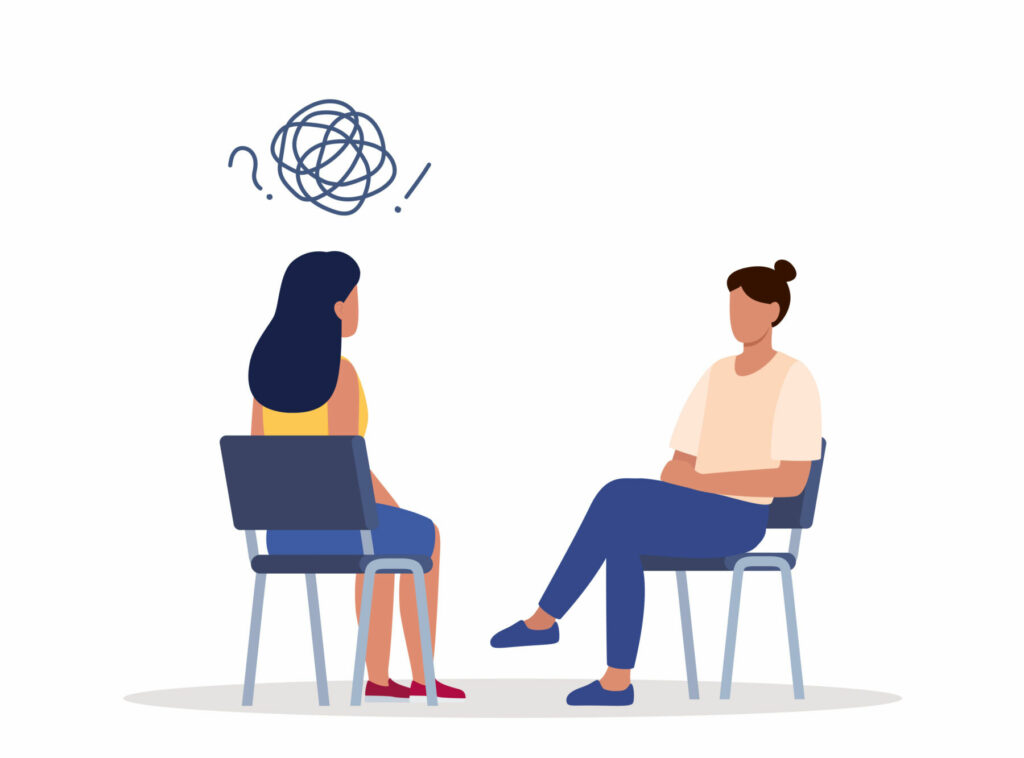What is Individual Therapy?

Individual therapy, also known as counseling or psychotherapy, is a form of mental health treatment that involves one-on-one sessions between a therapist and an individual seeking support.
This therapeutic approach is designed to help individuals explore their thoughts, feelings, and behaviors in a confidential and supportive environment. The goal of individual therapy is to promote self-awareness, emotional well-being, and personal growth. Don’t worry – you don’t have to know what’s bothering you or what you want to work on!
The Basics of Individual Therapy
Individual therapy sessions typically last around 45 to 60 minutes, although the duration can vary based on the therapist’s approach and the individual’s needs. The timing of sessions will be discussed by your therapist in your first session, or even in the intake documents.
These sessions can take place in person, over the phone, or through online platforms, providing flexibility and accessibility to a wide range of individuals. The format of your therapy can sometimes depend on your insurance and the comfortability/availability of your therapist.
The therapeutic process often begins with an initial assessment, where the therapist gathers information about the individual’s history, current challenges, and goals for therapy. This assessment helps the therapist tailor their approach to meet the specific needs of the individual.
Throughout the course of therapy, the individual and therapist work collaboratively to address and understand various aspects of the individual’s life. In the initial session, you also have the opportunity to ask questions.
You might find it helpful to bring a few questions to the initial session to gather more information about your therapist’s theoretical perspective, counseling style, and practice policies.
The Role of the Therapist
Therapists, also known as counselors or psychotherapists, are trained professionals with expertise in helping individuals navigate emotional and psychological challenges. They employ various therapeutic techniques and modalities based on their training, experience, and the needs of the individual (Maybe you’ve heard of CBT, EMDR, or psychodynamic psychotherapy?
These are simply approaches taken by the therapist to meet your goals). The therapist’s role is to create a safe and non-judgmental space for one to express themselves openly.
One of the key elements of individual therapy is the therapeutic relationship between the individual and the therapist. In fact, research consistently demonstrates that the therapeutic relationship is the most important factor in determining the outcomes of therapy! The therapeutic relationship is built on trust, empathy, and mutual respect.
The therapist provides support, guidance, and feedback to help the individual gain insights into their thoughts, emotions, and behaviors.
Additionally, therapists may teach coping skills, probe for deeper emotions, and highlight ways that a client is diverting from the subject or avoiding a topic.
Each therapist will have a different method of upholding these functions and fit can be key. If you don’t feel like the fit is right with someone, try again! It is important that you feel comfortable with your therapist and feel able to connect with them.
Common Therapeutic Approaches
Individual therapy encompasses a diverse range of therapeutic approaches, each with its own principles and techniques. Some common therapeutic modalities include:
- Cognitive-Behavioral Therapy (CBT): CBT focuses on identifying and changing negative thought patterns and behaviors that contribute to emotional distress. It is goal-oriented and often involves homework assignments to practice new skills.
- Psychodynamic Therapy: This approach explores unconscious processes and unresolved conflicts that may influence current thoughts and behaviors. Psychodynamic therapy aims to increase self-awareness and understanding of how past experiences shape the present.
- Humanistic Therapy: Humanistic approaches, such as person-centered therapy, emphasize the individual’s capacity for self-growth and self-actualization. These therapies prioritize the client’s unique experiences and perspectives.
- Mindfulness-Based Therapies: Incorporating mindfulness techniques, such as meditation and deep breathing, these therapies focus on being present in the moment. Mindfulness-based approaches can help individuals manage stress and cultivate a greater awareness of their thoughts and feelings.
If you’re curious about your therapist’s theoretical perspective, you can ask them questions like:
- “What theory do you use when working with clients?”
- “I’m struggling with x, what approach might you take to help me with this?”
- “What do you focus on in your therapeutic work?”
- “Can you explain what your theoretical perspective is and how it might show up in our work?”
- Feel free to also ask your therapist questions about values and how their values might show up in their work with you.
Who Can Benefit from Individual Therapy?
Individual therapy is suitable for people facing a wide range of challenges, including:
- Mental Health Disorders: Individuals experiencing conditions such as depression, anxiety, bipolar disorder, or post-traumatic stress disorder (PTSD) can benefit from individual therapy to manage symptoms and improve overall well-being.
- Relationship Issues: Therapy can be valuable for individuals dealing with relationship difficulties, whether in romantic partnerships, family dynamics, or friendships. It provides a space to explore communication patterns and enhance interpersonal skills.
- Life Transitions: Major life changes, such as career transitions, the loss of a loved one, or significant personal milestones, can be emotionally challenging. Individual therapy offers support during these transitions.
- Self-Exploration and Personal Growth: Even individuals without specific mental health concerns may seek therapy for personal development, self-discovery, and enhancing life satisfaction.
Therapy will look different for each individual. Your therapy will not be the same as your best friend’s or sibling’s, or parent’s therapy. There is no “right” way to do therapy and any reason to start is a “good enough” reason. If you want to start therapy but are unsure of where to start, your therapist can also help with this!
Confidentiality and Ethics
Confidentiality is a fundamental aspect of individual therapy. Therapists adhere to strict ethical standards to protect the privacy and trust of their clients. Information shared in therapy sessions is typically kept confidential, except in cases where there is a risk of harm to the individual or others. Exceptions to confidentiality might include (among others):
- Suicidality: Suicidal ideation (or thoughts about suicide) can naturally come up in therapy and you should talk to your therapist about this experience. It is nothing to be ashamed of and being able to talk about it can help us work through it. Suicidal ideation is not always a reason to breach confidentiality, so feel free to get clear with your therapist on where they/you would define risk to safety.Your therapist does have a legal obligation to protect you if you do not feel capable of keeping yourself safe. Ask your therapist how they might handle wellness checks, hospitalizations, or safety risks.
Together, you can create a safety plan so that confidentiality only needs to be breached in an emergency. Most therapists will define an emergency as the individual having a plan, motivation, and means to move forward with attempting suicide.
- Duty to warn: Therapists have a duty to warn individuals and groups of people if a therapy client plans to harm them. You can find out more about this ethical standard (and law).Note that you might want to have a conversation with your therapist about language patterns. For example, you might use a turn of phrase like “I’m so angry, I could have killed him!” This is almost always different than a plan to harm.
- Mandated Reporting: Therapists are mandated reporters and have a duty to report child/elderly/disabled person abuse.
Understanding the boundaries and ethical guidelines is crucial for establishing a trusting therapeutic relationship. If you’re confused or concerned about anything above, bring up your concerns and questions to your therapist. It might feel intimidating to talk about the above topics, but your therapist should be ready to answer any questions you might have.
The Benefits of Individual Therapy
Individual therapy can offer numerous benefits, including:
- Increased Self-Awareness: Through exploration and reflection, individuals gain a deeper understanding of their thoughts, emotions, and behaviors.
- Improved Coping Skills: Therapists equip individuals with practical tools and strategies to cope with life’s challenges, manage stress, and navigate difficult emotions.
- Enhanced Communication Skills: Therapy provides a space to practice and improve communication, fostering healthier relationships with others.
- Emotional Regulation: Individuals learn to identify and regulate their emotions, leading to better emotional well-being, and often, improved relationships.
- Personal Growth: Therapy supports individuals in their journey toward self-discovery and personal development, fostering a sense of empowerment and fulfillment.
Overcoming Stigma and Seeking Help
Despite the growing acceptance of mental health treatment, there can still be stigma associated with seeking therapy. It is important to recognize that asking for help is a sign of strength, and therapy is a valuable resource for improving mental and emotional well-being.
Individual therapy can be a transformative experience, providing individuals with the support they need to overcome challenges, build resilience, and lead fulfilling lives. You come to therapy with a set of skills and developed “muscles.” Therapy can be a space where you learn to work different muscles, strengthen existing ones, or give well-used muscles a break.
Individual therapy is a collaborative and confidential process that empowers individuals to explore their thoughts, emotions, and behaviors with the guidance of a trained therapist. Whether facing specific mental health challenges or seeking personal growth, individuals can benefit from the support and insights gained through individual therapy.
Breaking down the barriers to seeking help and embracing the therapeutic journey can lead to positive change and improve overall well-being.
Considerations for Individual Therapy
When embarking on the journey of individual therapy, there are several important considerations to keep in mind.
- First and foremost is the choice of a qualified and compatible therapist. Finding a therapist with the right expertise and approach is crucial for a positive therapeutic experience.
- Considerations such as the therapist’s credentials, experience, and therapeutic modality should align with the individual’s needs and preferences. Your therapist should be ready to provide you with their credentials and background. Remember, the therapeutic relationship is the most important predictor of therapy outcomes.
- Understanding the financial aspects, including fees, insurance coverage, and payment options, is essential to ensure a sustainable commitment to therapy. Your therapist might handle this directly, or the practice might handle this. At Tandem Psychology, our billing team provides estimates of insurance costs before you begin.That being said, if a financial issue comes up, talk to your therapist about it! Sometimes they can help find a solution to help you afford therapy. It can be an uncomfortable conversation to have, but it is also important to explore your options.
- Establishing clear goals and expectations for therapy, as well as discussing confidentiality and ethical guidelines, contributes to a transparent and trusting therapeutic relationship. It’s also important to recognize that therapy is a collaborative process, requiring active participation and open communication from both the individual and the therapist.
- Being patient with the therapeutic process and recognizing that personal growth takes time can contribute to a more fulfilling and transformative experience in individual therapy. Many of our habits, patterns, and ways of thinking have developed over a long period. Changing these things can take time as well.
If you’re looking to embark on a transformative journey of self-discovery and healing, individual therapy offers a supportive and confidential space to explore your thoughts and feelings, empowering you to navigate life’s challenges with resilience and grace. We would be honored to join your journey, in tandem with you!
This blog is made for informational and educational purposes only. It is not medical advice. The information in this blog is not intended to (1) replace a one-on-one relationship with a qualified licensed health care provider, (2) create or establish a provider-patient relationship, or (3) create a duty for us to follow up with you.



